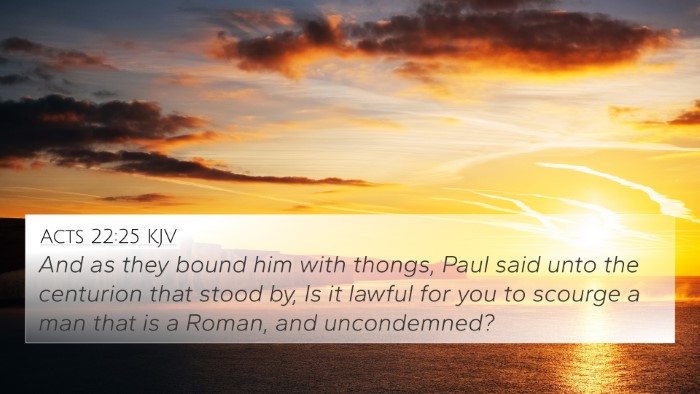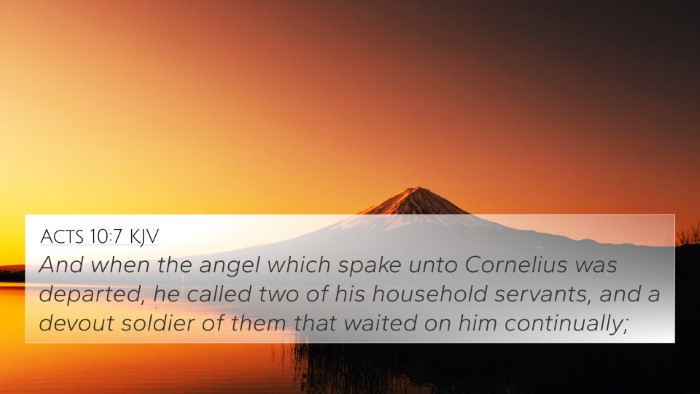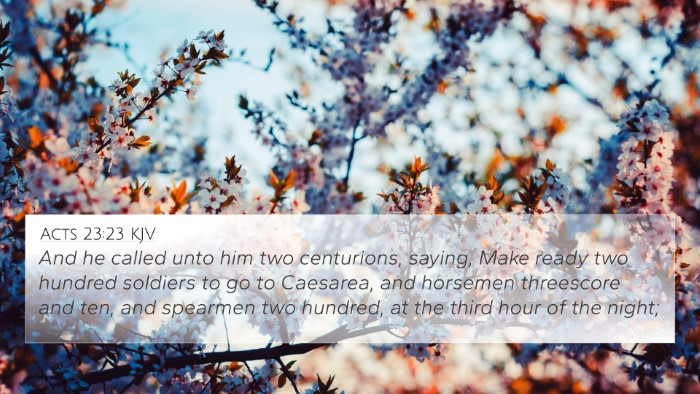Understanding Luke 7:8
Luke 7:8 states: “For I also am a man set under authority, having under me soldiers, and I say unto one, Go, and he goeth; and to another, Come, and he cometh; and to my servant, Do this, and he doeth it.” This verse is part of the narrative regarding the healing of the Centurion's servant, demonstrating the Centurion's understanding of authority and faith in Jesus' ability to heal.
Summary of Biblical Insight
The message within Luke 7:8 highlights several key themes of authority, faith, and the recognition of Jesus' divine power. It reflects the Centurion's humility and understanding of the chain of command both in military and spiritual realms.
Key Themes from Commentaries
- Authority and Submission: Matthew Henry notes that the Centurion recognized authority, which allowed him to draw parallels to Jesus' power. His statement shows a clear understanding of how authority functions both in human terms and in the divine.
- Faith and Trust: According to Albert Barnes, the Centurion's remarkable faith in Jesus’ ability to heal without physical presence illustrates a deep comprehension of Jesus's authority, transcending barriers of space and time.
- Humility: Adam Clarke emphasizes the Centurion's humility, as he felt unworthy to have Jesus come under his roof, displaying genuine reverence and recognition of Jesus’ position as the Messiah.
Bible Verse Cross-References
This verse can be linked to a variety of other biblical texts, revealing connections and reinforcing the themes of authority and faith:
- Matthew 8:9: For I am a man under authority, having soldiers under me — a similar verse affirming the understanding of authority.
- John 4:50: Go thy way; thy son liveth — a demonstration of faith in Jesus’ spoken word, analogous to the Centurion’s belief in healing from a distance.
- Hebrews 11:1: Now faith is the substance of things hoped for, the evidence of things not seen — reflects the essence of the Centurion’s belief.
- Luke 7:9: Jesus commended the faith of the Centurion, marking his faith as superior to those of Israel — further expanding on themes of faith and authority.
- Romans 13:1: For there is no power but of God: the powers that be are ordained of God — providing theological context for the nature of authority.
- Sermon on the Mount (Matthew 5-7): Jesus’ teachings about understanding authority and service parallel the mindset demonstrated by the Centurion.
- 1 Peter 5:6: Humble yourselves, therefore, under God’s mighty hand — highlights humility that resonated within the Centurion's plea.
- Matthew 15:28: O woman, great is thy faith — connecting the notion of great faith, akin to the Centurion’s affirmation.
- Hebrews 13:17: Obey them that have the rule over you — providing further context to the relationship between authority and obedience.
- Mark 9:24: Lord, I believe; help thou my unbelief — illustrating that faith may coexist with doubt, akin to how the Centurion asserted his belief.
Connections Between Bible Verses
Examining Luke 7:8 in relation to the above verses not only aids in understanding the specific passage but also unveils a broader theological perspective concerning faith and authority in the Bible:
- Identifying the connections between Old and New Testament emphasizes a continuity in faith—showing that the principles of reliance on divine authority permeate throughout scripture.
- This verse, along with Matthew 8:9, presents a comparative analysis demonstrating the understanding of earthly authority paralleling spiritual authority, which helps in deeper Bible study.
- Tools for Bible cross-referencing enhance the understanding of overlapping themes; by utilizing a Bible concordance or a cross-reference Bible study guide, one can locate various verses that echo the truths found in Luke 7:8.
Faith and Authority in Thematic Bible Verse Connections
Luke 7:8 serves as a pivotal reference for understanding how faith can operate within structures of authority, offering rich soil for a thematic study:
- Cross-referencing Biblical texts related to humility, such as 1 Peter 5:6, unveils a practice of humility underscored by reliance on divine power.
- Inter-Biblical dialogue structured by these cross-references allows for an enriched view of how authority was perceived in both testaments, especially through the lens of faith healing found in the Gospels.
- As demonstrated in Romans 13:1, authority is part of God’s plan, and understanding this context helps illuminate the humble approach of the Centurion who recognizes Jesus' sovereign authority.
Conclusion
Luke 7:8 serves as an emblematic verse showcasing the profound interplay between faith and authority. The insights drawn from public domain commentaries highlight the significance of understanding one’s position in relationship to Jesus, the original source of authority in both earthly and spiritual realms. As one engages in comparative Bible verse analysis, the connections and thematic discussions surrounding authority and obedience continue to resonate, allowing for a deeper comprehension of the scriptures.











